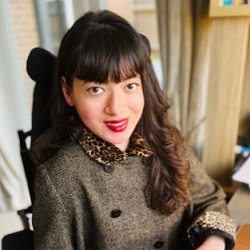
Nouka: Group aims to dismantle barriers
An organisation aimed at making the Bar more accessible to disabled people and improving the diversity of the judiciary was launched last week.
The founder and chair of Bringing (Dis)Ability to the Bar (BDABar), Konstantina Nouka, a law masters student who has Ulrich muscular dystrophy, said she launched BDABar because she had experienced extreme difficulties with attitudes to disability when applying for mini pupillage.
His Honour Judge Fayyaz Afzal, who is blind, told the online launch event attended by over 100 people that the group was “going to be absolutely essential, rather than desirable, to the way in which the diversity and inclusivity of the legal profession can be improved”.
He pointed out that while some 20% of the population reported a disability, this was not reflected in the profession. “Therefore disability is a seriously underrepresented group”, he said, meaning “those requiring the Bar’s services will not necessarily encounter the people that they are”.
He added this had a knock-on effect on the composition of the judiciary: “We cannot have a diverse judiciary if in turn there is not a diverse profession from which those judges can be appointed.”
According to figures published last week by the Bar Standards Board, 6.8% of barristers who provided information on disability status disclosed a disability, compared to an estimate of 16.4% for the wider employed population.
Trustees include Alison Hunter QC of 23ES, Mary Prior QC of 36 Group and Christina Warner of Goldsmiths Chambers.
The group has a research section with 14 researchers. Projects include examining barristers’ attire to devise ‘reasonable adjustments’ that will suit disabled people.
Ms Nouka told Legal Futures she had been exposed to “severe discrimination”. Disabled people similarly treated “feel overwhelmed and alone as they see the Bar as a very exclusionary profession with people often telling them that this is not the right profession for them”.
She believed the challenges and barriers facing disabled aspiring barristers “stem from a lack of understanding and awareness on disabilities and the superficial understanding that the Bar has of what accessibility and reasonable adjustments really mean”.
She hoped BDABar would “dismantle barriers and change the perceptions that affect disabled individuals in accessing the Bar”.
Ms Nouka added that the Bar Council had shown “quite a positive attitude” so far and had arranged meetings. This was “very encouraging”.












Leave a Comment